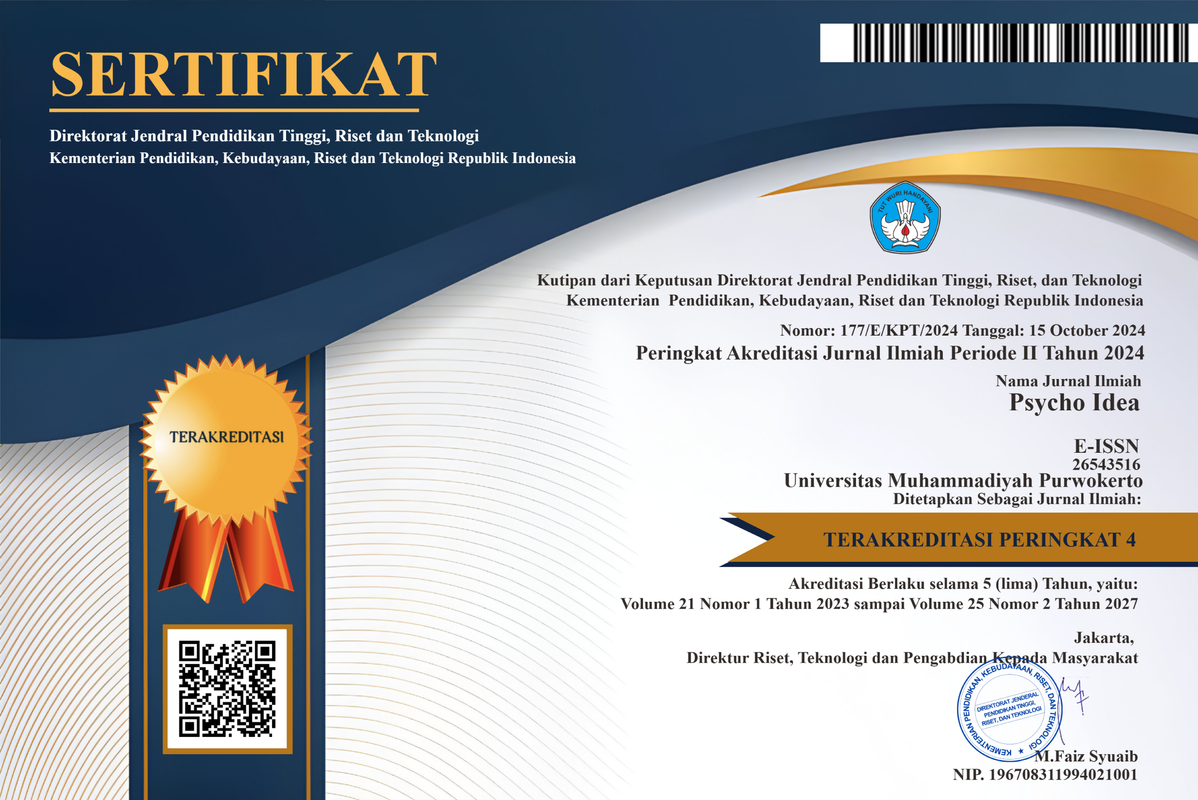Hubungan antara Mindfulness dengan Regulasi Emosi pada Guru yang Mengajar Anak Berkebutuhan Khusus
DOI:
https://doi.org/10.30595/psychoidea.v21i1.16156Keywords:
mindfulness, regulasi emosi, anak berkebutuhan khusus, guru sekolah inklusiAbstract
Guru yang mengajar anak berkebutuhan khusus (ABK) di sekolah inklusi memiliki banyak tantangan dibandingkan guru non-inklusi. Secara tidak langsung tantangan dari pekerjaan tersebut berpengaruh terhadap emosinya, oleh karena itu dibutuhkan regulasi emosi yang baik. Salah satu strategi yang memengaruhi regulasi emosi yaitu mindfulness, karena mindfulness dapat membantu seseorang fokus pada proses dan tujuan hidup, serta mampu mengontrol pikiran agar tidak bereaksi secara berlebihan terhadap kondisi yang tidak menyenangkan. Penelitian ini bertujuan untuk menganalisis keterkaitan antara mindfulness dengan regulasi emosi pada guru yang mengajar ABK di sekolah inklusi di Aceh melalui pendekatan kuantitatif dengan metode korelasi. Sebanyak 116 guru sekolah inklusi terlibat sebagai sampel penelitian yang dipilih menggunakan teknik non probability sampling jenis insidental. Regulasi emosi diukur menggunakan Emotion Regulation Questionnaire (ERQ), sedangkan mindfulness diukur menggunakan Mindful Attention Awareness Scale (MAAS). Hasil analisis data menunjukkan bahwa tidak terdapat hubungan antara mindfulness dengan regulasi emosi pada guru yang mengajar ABK. Meskipun tidak terdapat hubungan diantara variabel, hasil menunjukkan guru memiliki regulasi emosi dan mindfulness yang tinggi. Hal ini dapat disebabkan karena adanya faktor-faktor lain yang mempengaruhi variabel tersebut.
Downloads
Additional Files
Published
Issue
Section
License
Authors published in this journal agree to the following terms:
- The copyright of each article is retained by the author (s) without restrictions
- The journal allows the author(s) to retain publishing rights without restrictions
- The author grants the journal the first publication rights with the work simultaneously licensed under the Creative Commons Attribution License, allowing others to share the work with an acknowledgment of authorship and the initial publication in this journal.
- Authors may enter into separate additional contractual agreements for the non-exclusive distribution of published journal versions of the work (for example, posting them to institutional repositories or publishing them in a book), with acknowledgment of their initial publication in this journal
- Authors are permitted and encouraged to post their work online (For example in the Institutional Repository or on their website) before and during the submission process, as this can lead to productive exchanges, as well as earlier and larger citations of published work
- Articles and all related material published are distributed under a Creative Commons Attribution-4.0 International Public License (CC - BY 4.0).
License
Psycho Idea is licensed under a Creative Commons Attribution- 4.0 International Public License (CC - BY 4.0).
You are free to :
Share — copy and redistribute the material in any medium or format
Adapt — remix, transform, and build upon the material for any purpose, even commercially











